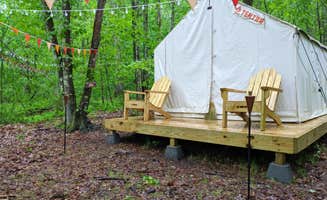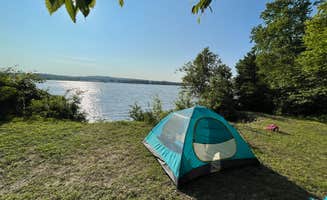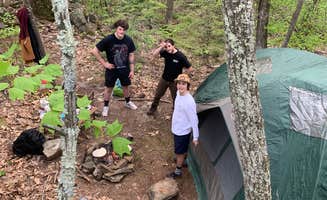Tent camping near Putnam, Connecticut offers a variety of experiences within 30 miles of town, including both primitive backcountry sites and established campgrounds with basic facilities. Most locations operate seasonally from May through October, with limited winter camping options. The region features distinct terrain across the Connecticut-Rhode Island border, with elevations ranging from river valleys to wooded hills that provide different camping environments depending on location.
What to do
Water recreation: Selden Neck State Park campground provides unique island camping with shoreline access for swimming and fishing. According to a camper, "At low tide, a couple of beaches emerge to play on. The sunset view was amazing."
Hiking opportunities: The trails around Onion Mountain Park connect directly to campsites. A visitor notes, "We ended up finding a very primitive spot off the blue trail (on top of the mountain), where we settled down for the night."
Stargazing: Open areas at several campgrounds offer clear night sky viewing during summer months when foliage doesn't completely obstruct the view. A weekend trip during the new moon phase provides optimal conditions for stargazing.
What campers like
Remote settings: Chapman Pond Preserve offers seclusion with riverside tent platforms. A camper reports, "Good tent platforms, picnic tables and outhouse. CT river within view."
Beginner-friendly areas: Some locations provide accessible camping for those new to outdoor experiences. A visitor to Onion Mountain Park mentioned, "My BSA troop has been going here for years to help new scouts learn to camp. It is a very casual site and good for your first trip."
Wildlife observation: Early morning hours provide opportunities to spot local wildlife including deer, foxes, and various bird species. Many campsites are positioned where animal activity is common during dawn and dusk.
What you should know
Site accessibility: Many campgrounds require some physical effort to reach. At Onion Mountain Park, a visitor clarifies, "Other posts claim you can park right at the site, but you cannot. It's up the yellow or blue trail depending on which one you take. However, it's not a long walk to the parking area from the campsite."
Water transportation requirements: Boat-in access means planning for equipment transport. For Selden Neck State Park, a camper advises, "It's about a 20 minute paddle across the river to the island. If it's a nice day, you're going to encounter some wake from passing boats so make sure your gear is in waterproof bags."
Limited facilities: Most tent camping sites provide minimal amenities. Expect outhouses rather than flush toilets, no electricity, and pack-in/pack-out trash policies at most locations.
Seasonal considerations: Spring camping often means dealing with mud and higher water levels, while summer brings increased insect activity. A camper warns, "There are a lot of bugs so be prepared, and we did put a bear bag about 100 feet away."
Tips for camping with families
Choose accessible locations: Sites with shorter approaches work better for families with young children. One visitor shared their experience: "We have camped on the south end of Hurd Park several times via boat access. It is amazing with the views of the CT River and being able to watch the sunrise and sunset."
Weather preparation: The Connecticut River valley can experience significant temperature fluctuations between day and night, even in summer. Pack layers appropriate for both daytime activities and cooler evenings.
Activity planning: Include water-based recreation when possible. Several campgrounds offer swimming and fishing opportunities that keep children engaged during daylight hours.
Tips from RVers
Limited RV options: The region primarily supports tent camping, with few RV-appropriate sites. Most locations have no hookups, narrow access roads, and limited turnaround space.
Alternatives: RVers should consider established private campgrounds within 15-20 miles that offer full hookups as alternatives to the primitive sites closer to Putnam.
Day use strategy: Use RVs as base camps at equipped facilities while making day trips to explore the natural areas around Putnam. This approach provides comfort while still accessing the region's outdoor experiences.




